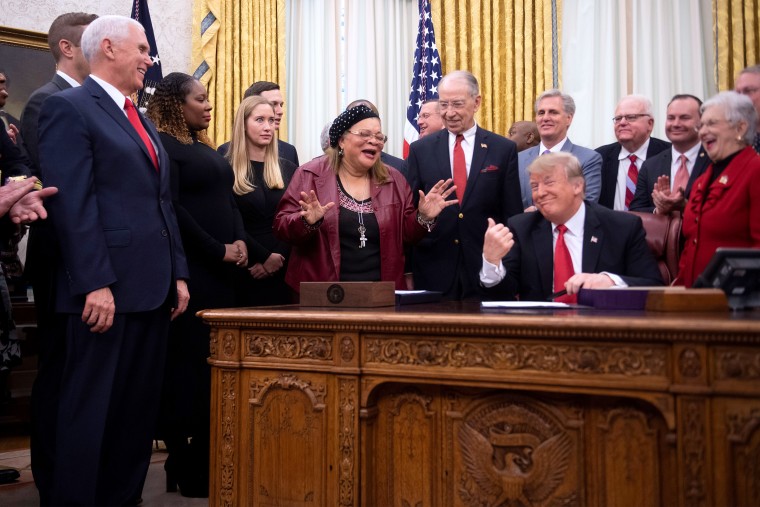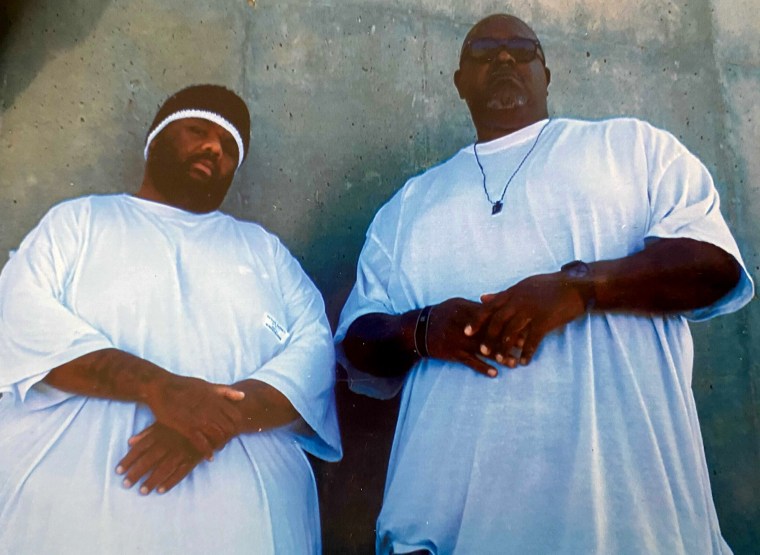The Supreme Court's decision restricting the use of a landmark 2018 drug reform law landed like an anvil Monday morning at the Decarceration Collective, a Chicago law firm that seeks to free people serving life sentences for federal drug crimes.
The unanimous ruling said the law — which has been used to cut the sentences of thousands of federal drug offenders, including many accused of handling large amounts of crack cocaine — couldn't be used to reduce the sentences of people convicted of possessing small amounts of crack. The court's ruling came over the objections of the law's authors, who said they intended to help those low-level offenders, and the Biden administration, whose Justice Department declined to argue for the narrow interpretation of the law in court.
"It's a shocking loss," said MiAngel Cody, lead counsel and justice policy analyst at the Decarceration Collective.
Cody said she has represented a "kingpin" convicted of possessing thousands of kilos of crack who was released under the 2018 law, known as the First Step Act, which aimed to ease harsh drug sentencing statutes that has disproportionately punished Black people. But the court's ruling means people convicted of selling less than 28 grams of crack —about the weight of a AA battery — "can't go back into court" to seek a reduction, Cody said.
"They just had the door shut in their face, and that's completely unfair," she said. "That makes no sense from a public safety perspective."
The case was brought by Tarahrick Terry, a Black Florida man who was sentenced to more than 15 years in prison for possessing 3.9 grams of crack cocaine — about the weight of four paper clips. Terry argued that he should be eligible for a reduced sentence under the First Step Act.
The 2018 law was Congress' latest attempt to undo 1980s federal drug laws that allowed for much harsher penalties for possession of crack cocaine than for possession of powder cocaine. The first round of changes, passed in 2010, narrowed the disparity, but it didn't apply to people who had already been sentenced or to those sentenced for possession of small amounts of crack. The First Step Act, which was passed in a rush of activity during the final weeks of a lame-duck Congress, made the earlier changes retroactive — but still only explicitly for people sentenced for possession of larger amounts of crack.

Many of the people affected by the Supreme Court's ruling, like Terry, were hit with harsh penalties for possessing small amounts of crack because they had previously been convicted of other drug offenses.
Lower courts ruled against Terry, 33; the Justice Department under then-President Donald Trump argued that the First Step Act didn't apply to him. The agency switched course under Biden — but that didn't convince the Supreme Court.
The court, in a 9-0 decision written by Justice Clarence Thomas, said the First Step Act was limited by a technical omission: It left out the lowest rung of offenders.
Justice Sonia Sotomayor pointed out the discrepancy in a concurring opinion, noting that the law's sponsors urged the court to rule that it be applied to low-level offenders. But the law itself said something different, she wrote, an "injustice" that can be corrected only by Congress.
The ruling frustrated many people who lobbied for the law across the political spectrum.
"I think it's a nonsensical interpretation," said Holly Harris, who pushed for passage of the First Step Act as president and executive director of the Justice Action Network, which recruits lawmakers from the left and the right to support changes in the criminal justice system. "For those of us who were at the table litigating this bill, the one thing we said over and over is we want relief for low-level nonviolent offenders."
Mark Holden, chairman of the board of Americans for Prosperity, a conservative policy group, who pushed for the First Step Act, agreed, saying Congress should pass a law making the relief for low-level offenders unambiguous.
"This should be something done quickly," Holden said.
Sen. Dick Durbin, D-Ill., chairman of the Judiciary Committee, said Monday that the Senate would work to fix the law and that he hoped there would be bipartisan support.
Harris said that while the ruling was disappointing, it is an opportunity to gather support in Congress for more criminal justice reform bills, including one that would clarify the First Step Act's intent for low-level offenders. She is also advocating for the Equal Act, which would eliminate the crack-to-powder cocaine sentencing disparity completely.
In addition, her organization is urging the Biden administration to abandon a Trump Justice Department memo saying 24,000 nonviolent inmates released to home confinement to curb the spread of Covid-19 in prisons must be sent back to prison if their sentences haven't ended.
Jacki Phelps, appellate litigation counsel at the Decarceration Collective, said she believed that the authors of the First Step Act hadn't made a mistake but that the Supreme Court had.
The impact is hard to calculate, because there is no simple way to measure how many prisoners had their paths to potential early release cut off, Phelps said.
Cody and Phelps pointed to one example, in addition to Terry: Jahmal Green, 45, who is serving a life sentence for a 2006 conviction for distributing less than a gram of crack in Iowa after earlier drug convictions.

Green, who is Black, had withdrawn all of his pending court motions because he was hoping for a more favorable law to help him, said Cody, who has been following his case. Lawyers representing many prisoners in similar situations also put their appeals on hold to wait for the ruling in Terry's case, Phelps said. They expected it to be in their favor.
"We really don't know how many people are sitting in federal prison for these low-level paper clip-sized amounts whose claims were foreclosed by this Terry decision," Phelps said.
"If these defendants had sold more crack, then they would be eligible for sentencing relief. That's contrary to what Congress intended and contrary to common sense."
Delyla Green, 29, a niece of Jahmal Green’s, said in an interview that he is in a prison in Arizona, far from family in Chicago and Minneapolis. He has diabetes and applied for compassionate release but was denied, she said.
“Its just been so tough,” she said. “My dad, his brother, just passed, and he wasn’t able to be there for that. He missed the birth of my son. He didn’t get a chance at life, really.”
She said that despite the Supreme Court setback, her family would continue searching for ways to reduce his sentence.
“We’re not going to give up until he’s free,” she said. “Whatever it takes.”

